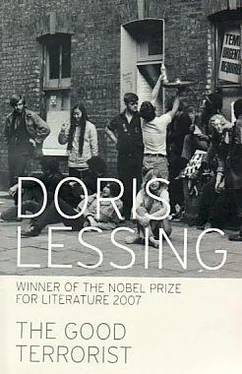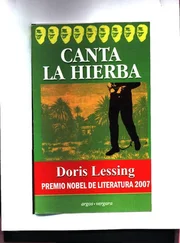"Why don't you go and get some more from your fucking bloody mother, from her? Or from your father?"
She had not told him exactly where she had got all the money that had been spent so freely around this house, but of course he had guessed.
She said steadily, "I shall. When I feel I can. But I can't now."
He let go her wrist and stood up.
Now he is going to punish me, he's going to take his things into another room to sleep.
A long silence, while he fidgeted disconsolately about.
"Let's go out for a meal," he suggested, dolefully.
"Yes, let's." Her spirits swooped up again, although there had been no mention of spray-painting, and he had seen the scribbled slogans on the envelope on the table.
He said, nicely, "I am sorry about not going out painting tonight, Alice. But what's the sense? I don't want to draw attention to myself just before something important."
"Quite right, of course," she said. Thinking that in years of spray-painting, of darting about near the police and taunting them with their nearness, they had been caught only when they wanted to be. That was the truth of it.
Jasper wanted to talk about the two days down at Melstead, about the pickets, the excitement of it all, the arrest, the night in the cells - and about Jack. They went to an Indian restaurant, where he talked and talked, and she listened very carefully, matching what he said with her imaginings of it all. She paid for the meal. They went into a pub and he drank his usual white wine, and she, tomato juice.
Back at the house, she waited, tense, to see whether he would take his things up to another room, but he said nothing about it, only slid into his bag with a sigh that assuaged her; it was the sigh of a child finding a safe place.
He had not said anything more about money, but now he started again. That was why he had not taken his things out.
They argued, steadily, in the dark room, while the lights whirled over the ceiling. In the end she agreed to give him the ^ money for "Jack's" fare. She knew that for some reason it was important for Jasper to have it from her. Essential. There always had been these moments between them when she had to give way, against reason, against sense: he simply had to win. She knew that he had a hundred pounds, probably more. Perhaps even very much more. Once he had told her, in a mood of taunting cruelty that sometimes overtook him, that he had been saving up quietly all these years, enough money "to be rid of you forever."
This did not make any sense that she could see when she thought: but she felt the power of it.
His mother - well, Alice wasn't going to get involved even with the thought of all that dreary psychology, but no wonder he had problems with women.
In the morning, after their breakfast coffee, he stood silently and balefully near her until she gave him the fare to Dublin. Then he said that he was going to meet Jack and talk things over. If he was not back tonight, he would be tomorrow, and she must tell Bert that they were going to Ireland on Tuesday, early.
He left. She thought: Is he going on one of his things, then - cottaging, cruising...? She believed not. He wouldn't risk it, not with his whole soul set on the trip to Ireland. Was "Jack," then, like him? No, she was sure not. Talking about Jack, it was how he talked about Bert, how he talked about the men with whom he had this particular relationship: admiring, dependent, you could say passive... but who was it now who set the pace, making Bert go to Ireland, making Jack take them? No, not simple at all, this younger-brother thing.
She had the whole day. Alone, you could say.
Philip had climbed up into the attic - she must go up and help him, stand by him, or he would start feeling ill again. Jim - where was Jim, what was wrong? He had not been in since yesterday.
Faye and Roberta? She had heard them come in very late. Pat said they went to late-night movies, and then on to parties. Their other life - women. The close, sweet, bitchy - as far as Alice was concerned - cloying, claustrophobic world of women. Not for her! But they were welcome to it. Let a thousand flowers bloom, and all that.... Ten in the morning, and Mary and Reggie were still in bed. Mary had come down, made mugs of coffee, taken them up, and they lay, no doubt, side by side, in that amazing double bed, which had a proper headboard and little built-in side tables. Even the thought of that bed, the life that the bed implied, made Alice feel threatened. Stuck together for a lifetime in that bed, drinking cups of coffee, looking at people who were not like themselves in that cautious keep-off way.
Where was she going to get money. Where. She had to have it. Had to have money. Had to.
Sunday.
Good grief, it was only Sunday, six days after she and Jasper had left her mother's - had left home. She had achieved all that, in such a short time. Full of energy, she went up to the attic and to Philip, in his white overalls, a brave manikin moving about under the rafters of the attic. There was a horrible smell of rot.
"Two of these beams ought to be replaced," he said. "Dry rot. We'll have the whole house down."
Money. She had to have money.
Too early to ask Mary and Reggie. At some point a negotiation would take place. Already she could see their faces, the faces of the fucking bloody middle class, when the subject of money was on the agenda. God, how she hated them, the middle classes, penny-pinching, doling out their little bits, in their minds always the thought of saving and accumulating, saving - thought Alice, her mouth full of bile, as she stood gazing up at a beam a foot across that looked grey and flaky, with whitey-yellow fibres in it. The dry rot itself, which would lay its creeping arms over all the wood, if it were allowed, then creep down the walls, into the floor below, spread like a disease...
She thought: I've been living like this for years. How many? Is it twelve, now? No, fourteen - no, more... The work I've done for other people, getting things together, making things happen, sheltering the homeless, getting them fed - and as often as not pay- ing for it. Suppose I had put aside a little, even a little, of that money, for myself, what would I have now? Even if it were only a few hundred pounds, five hundred, six, I wouldn't be standing here sick with worry....
"How much will it cost to replace those two beams?"
"The wood, about fifty - second-hand. Though I could probably find what I need on a skip if we could borrow the car again.
"As for the labour..." he said with a defiant little laugh.
"Don't worry," said Alice. She was thinking: And he'll need help. He can't possibly shoulder great beams into place, stand about propping up beams; he'll need scaffolding or something. That means money.
She would go down and ask Mary and Reggie.
On the table a note, "We've gone to the Greenpeace demo. Love. Reggie and Mary." His writing. "Love"! She sat at the table and counted what she had left. She had thirty-five pounds.
She went up again and worked on with Philip, clearing rubbish out of the attics. Where did it all come from, always rubbish and rubbish, sacks of it again, old clothes, rags most of them, and an old carpet, quite fit for use, more old clothes. Junk. Junk? At the bottom of an old black tin trunk, under cracking and broken shoes, were layers of fine soft material, dresses wrapped in black tissue paper. Evening dresses. She threw them down through the trap door and jumped after them to look. Well, look at that! Three really beautiful evening dresses, each individually wrapped in the black tissue paper. The early thirties. One was of black and orange and yellow lace, with gold thread in it. It had a plain smooth bodice to the hips, then flared out in a lot of little points, like petals. The metallic smell of the gold lace made her want to sneeze.
Читать дальше











